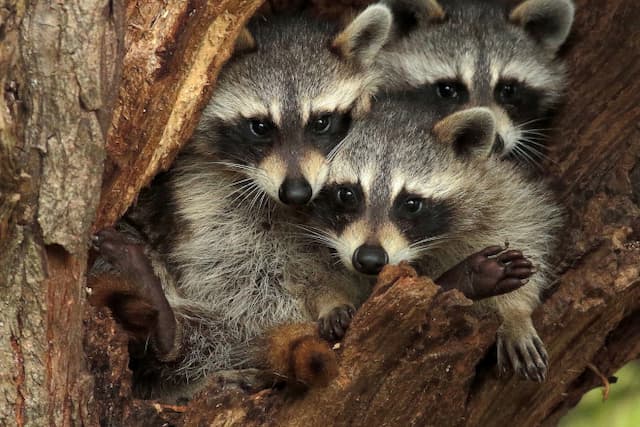The thought of getting sick with roundworm is quite unsettling. When humans ingest roundworm eggs, the eggs hatch within the host’s gut and risk migrating to the brain and eye, causing severe disease and even death. Not all raccoons have roundworm, but it is safer to assume that they do. Some studies have shown that infection rates are as high as 70% in adult raccoons and 90% in juveniles. Infected raccoons shed millions of roundworm eggs in their feces, so it is best that you stay away. If there are raccoon droppings on your property, call a professional for safe removal.
What is Roundworm?
There are thousands roundworm species. Baylisascris procyonis, or raccoon roundworm, is a parasitic roundworm that lives in the intestines of raccoons. An infected raccoon may have several worms inside of it. Roundworms produce thousands of eggs per day, which are passed in their host’s feces. Eggs are invisible to the naked eye and permeate the soil where they have been deposited. They may also become airborne when the feces dry. Raccoons and other animals become infected by ingesting the eggs accidentally. Touching a dirty surface or breathing in the air around a raccoon latrine could make you sick.
How to Remove a Raccoon Latrine
Raccoons tend to deposit their feces in the same locations every time, creating piles of waste known as latrines. Latrines are commonly found on rooftops, decks, lawns, and other surfaces surrounding the home. Removing them is best left to the professionals, but you can do it yourself with the right equipment. Put on some disposable gloves, rubber boots, booties, and a mask. Then, spray the latrine with disinfectant to avoid stirring up any roundworm eggs. Scoop up the feces into a plastic bag, then pour boiling water over the dirty surface. If indoors, you can scrub the surface in soapy hot water. Throw out your gloves, booties, cleaning materials and bag as soon as you are done.
Raccoon-Proof Your Home
If you want to avoid roundworm, make your home unattractive to raccoons. Remove bird feeders from the yard and switch to secure garbage cans. If you can, store them in a shed or garage until garbage day. Avoid leaving any pet food out overnight and always clean up after a meal outdoors. Cover the pool at night. Next, you should examine your roof and deck for points of entry. Raccoons will squeeze through 4-inch gaps to den in a safe location. Cover your roof vents and chimney with steel mesh to avoid an invasion. Make sure your soffits are in good shape.
Raccoons are common throughout the GTA and it is likely that most of them have roundworm. Though it does not harm raccoons very much, it is lethal to humans and other animals. If there are raccoons on your property, call a wildlife remover as soon as possible. You should also have a professional remove any latrines you find because they could make you or your loved ones sick with roundworm. Our technicians use hospital-grade disinfectants and steam cleaners that destroy roundworm eggs on the spot. We can remove the feces on your property safely and keep raccoons out by pest-proofing your property.
